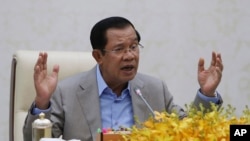Cambodia’s use of incitement laws to jail journalists sends a threatening message to news outlets and could result in self-censorship, media experts say.
The country’s vaguely worded incitement law is often used against detractors of Prime Minister Hun Sen’s government, international rights groups say.
Recently, the law was used to jail three journalists, in a move that local press groups warn could silence critical reporting.
Ros Sokhet, publisher of the Cheat Khmer newspaper, was arrested June 25; Sok Oudom, owner of the Rithysen Radio News Station, was taken into pretrial detention in May; and Sovann Rithy, who runs the Facebook-based TVFB news outlet, was charged in April. All three are in custody in Phnom Penh.
Ith Sothoeuth, media director at the Cambodian Center for Independent Media, said the government should not use criminal code provisions, such as incitement, against journalists, especially if they were only expressing opinions.
“We have the Press Law, and I think in cases related to journalists, we should use this law, especially when they are expressing opinions,” Ith Sothoeuth said.
Cambodia’s Law on the Press is supposed to deal with any infractions by journalists or news publications.
Nop Vy, executive director of the Cambodia Journalist Alliance, said the arrests were a “threat” or warning to other reporters to refrain from critical reportage, and that authorities should use the Press Law rather than criminal charges.
“Journalists now are more fearful of writing their articles,” Nop Vy said. “Those journalists will restrict their freedom of expression [by not] writing opinion pieces.”
Khan Leakhena, a journalist who covers controversial issues like politics and land-ownership disputes for local publication Voice of Democracy, said the arrests made her worry that she may be detained.
“I am afraid that they will pick up any mistakes [in my stories] and accuse me of incitement,” the 29-year-old reporter said. “Even if I work professionally, I am still worried. I don’t know when I can be the target.”
Information Ministry spokesperson Meas Sophorn denied the arrests were related to press freedom or the right to free expression and said the reporters had broken the law.
The spokesperson added that the ministry was considering whether to revoke Ros Sokhet’s media outlet’s license but did not say why such a move was necessary.
A Phnom Penh court issued an arrest warrant for the publisher for “incitement to commit chaos,” according to Phnom Penh Police Chief Sar Theth.
Sar Theth referred questions on why the journalist was arrested to the Phnom Penh Municipal Court.
A spokesperson for the court did not respond to requests for comment.
Court and police officials have not said publicly why Ros Sokhet was arrested. A few days before he was detained, the journalist posted critical comments on Facebook including about Prime Minister Hun Sen’s response to economic hardships caused by the coronavirus pandemic and alleged plans to make Hun Sen’s son the next prime minister.
In Sok Oudom’s case, the radio owner was charged with incitement to commit a felony after he broadcast a Facebook Live report on a land dispute in Kampong Chhnang province’s Phnom Oral Wildlife Sanctuary.
A court spokesperson told VOA said the journalist was guilty of “inciting villagers to grab military and state land for private ownership.”
TVFB journalist Sovann Rithy was charged with incitement after reporting on Hun Sen’s speech at the government building Peace Palace.
Local police officials said the prime minister’s comments in his speech that motorcycle taxi drivers should sell their vehicles to buy food if affected by the pandemic were made in jest and not to be reported seriously.
Cambodia’s media work in an already restrictive climate. The country ranks 144 out of 180 countries, where one is the most free, in Reporters Without Borders’ 2020 press freedom index.
Under a crackdown that started after the 2017 commune elections, The Cambodia Daily was closed for alleged tax violations, and The Phnom Penh Post was sold to a Malaysian investor with links to Hun Sen. Two former Radio Free Asia reporters were charged with espionage and two former Cambodia Daily reporters are awaiting trial for incitement over a 2017 story.




